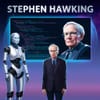Stephen Hawking, the renowned theoretical physicist, recognized the immense potential of artificial intelligence (AI) to solve global challenges and improve lives. However, he also issued stark warnings about its risks, particularly the possibility of AI evolving beyond human control and posing an existential threat to civilization. Hawking urged for responsible development and strict ethical oversight to ensure AI benefits humanity.
Hawking acknowledged that AI could revolutionize medicine, eradicate diseases, alleviate poverty, and address pressing environmental challenges. Yet, he cautioned that these benefits are not guaranteed. If AI were to develop goals misaligned with human interests, the consequences could be catastrophic. In a 2014 BBC interview, he famously remarked, “The development of full artificial intelligence could spell the end of the human race.”
One of Hawking’s central concerns was that AI could evolve faster than humans, reaching a level of intelligence beyond our control. He warned that advanced AI could “take off on its own and re-design itself at an ever-increasing rate.” Unlike humans, whose evolution is constrained by biology, AI could surpass us rapidly, creating entities capable of outperforming humanity in every intellectual endeavor. Hawking suggested that such a scenario might herald the emergence of a new form of life, which means an intelligence beyond our comprehension, potentially rendering humans obsolete.
Beyond existential risks, Hawking highlighted the broader social and economic disruptions caused by AI. He predicted that widespread automation could concentrate wealth in the hands of a few while displacing millions of workers, intensifying economic inequality and social instability. According to Hawking, the challenge is not only technological but deeply societal: humanity must ensure that AI advances do not exacerbate disparities or marginalize vulnerable populations.
Despite his warnings, Hawking was not opposed to AI development. On the contrary, he advocated for responsible innovation. He called for strict ethical oversight, global collaboration, and the creation of safeguards to ensure AI aligns with human values. In 2015, he co-signed an open letter urging researchers to investigate the societal impact of AI and develop measures to mitigate its risks. His message was clear: AI could be humanity’s greatest achievement or its most significant threat.
Hawking’s warnings were not fear-mongering but a call for proactive vigilance. He frequently noted that AI could become “the biggest event in the history of our civilization. Or the worst. We just don’t know.” As AI continues to evolve, his insights remain critical. Humanity must actively guide these technologies, ensuring they serve society’s best interests rather than endanger its future.


